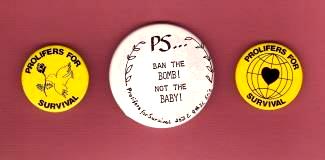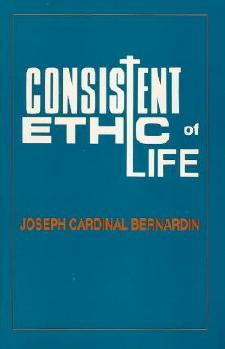|
The following appeared, in slightly different form, in U.S. Catholic, August 2008. Copyright © 2008 by Mary Meehan. Let's Revisit the Consistency Ethic Mary Meehan  We were a hopeful band of pro-life peaceniks, venturing out one summer day of 1979 to dialogue with other folks on the left. They were demonstrating in Cincinnati against a National Right to Life Convention. We leafleted them and carried picket signs such as "Anti-War = Pro-Life/Be Consistent!" Juli Loesch, a brilliant young writer, soon organized us into Prolifers for Survival (P.S.), a pro-life and pro-peace group. Because most of us were veterans of 1960s activist causes, P.S. had more impact than its numbers might have suggested. Yet it was always a shoestring operation--lots of heart and commitment, but no money. It lasted until 1987, when it was replaced by a group that's now called Consistent Life. Congenial groups include Feminists for Life and Democrats for Life. When I first heard about "the consistency thing" in the early days, I understood it to mean consistent opposition to direct homicide: abortion, war, euthanasia, and the death penalty. But when the late Cardinal Joseph Bernardin of Chicago explained his vision of the consistent ethic of life in 1983, it was far broader than that. He said that those "who defend the right to life of the weakest among us must be equally visible in support of the quality of life of the powerless among us..." That stance, he said, "translates into specific political and economic positions" on taxes, welfare policy, health care, and more. That was a huge jump to make. Cardinal Bernardin apparently had in mind the specific positions of the U.S. Catholic bishops on such issues. Yet those positions do not bind in conscience Catholics or anyone else. They are lobbying goals--certainly well-intentioned, but just as certainly subject to debate on philosophical and practical grounds. Yet the ban on killing other human beings--except in self-defense--binds all of us. While I admired Cardinal Bernardin, I believe he and others took the consistency ethic a bridge too far. This is one reason why it never achieved the popular support it deserves and why it has little influence on national politics. Something Juli wrote nearly 30 years ago is still true today; most congressional candidates "look like a cross between Francis of Assisi and Attila the Hun."  Meanwhile, the list of consistency issues has grown so long that it's almost meaningless. Some have suggested that consistency even covers better schools or environmental issues. It's not just that abortion gets lost in the shuffle, as conservatives have complained for years. So do other forms of direct killing. Yet homicide causes the worst misery in the world. If we could stop people from killing one another, that would be the greatest advance for peace and justice in world history. And it would unleash vast energy and resources to deal with quality of life. To get there, we need a keener sense of priorities. Dr. William Colliton, a veteran prolife activist in Maryland, once said, "If you want to ask an individual, 'Do you prefer to be dead or poor?' I'm gonna take poor." So would most of us. People whose right to life is respected have the chance to agitate for change on other issues. The dead, though, have no free speech or right to organize. Placing first priority on life is in some ways a preferential option for the poor and for minorities. They have been targeted for population control and abortion for decades. They are vastly over-represented on death row, and euthanasia is a greater long-term threat to them than to others. Poor people, lacking both money and passports, find it hard to escape the horrors of war. If we help save the lives of those threatened by lethal discrimination, they will have a chance to win their place in the sun. If we don't, they won't. The consistent life ethic is like a sturdy cow pony, willing and able to do its real work out on the range. But some have commandeered the pony for pack-horse work and burdened it with such heavy loads that it can scarcely walk. What would it take to unburden the pony so it can lope along the range with its natural grace--rounding up stray liberals here, unhappy conservatives over there, and clusters of moderates across the valley? So it can put together a coalition that will challenge killing across the board?  Shortening the issues list to direct homicide is the first step. Consistency advocates would still be free to campaign for better schools, cleaner air, and health-care reform; but I believe they should ride a different pony when they do so. Experienced cowhands, after all, know which ponies and crews are best for the job at hand. The second step toward making the consistency ethic come alive is finding better ways to reach conservatives. In a 1981 essay in the New Oxford Review, English writer Christopher Derrick stressed that war "tends to destroy everything that conservatives would wish to 'conserve' at the social, cultural, moral, and religious levels." The First and Second World Wars, he suggested, had much do with "the present cultural breakdown of the West." I would add that many Vietnam veterans returned to America with horrific drug addictions and mental illness, contributing to family and cultural disintegration at home. And Lt. Col. Dave Grossman, in his 1995 book On Killing, describes psychological suffering of combat veterans that all conservatives should think about. It's also important to talk with conservatives about the terrible effects of war on children, both born and unborn. To mention just one of many examples: Twelve-year-old Ali Ismaeel Abbas, wounded by the U.S. bombing of Iraq in 2003, suffered terrible burns and lost both his arms. He also lost his mother, his father, and all of his sisters and brothers (one of them an unborn child). This is what "collateral damage" means.  Conservative elder statesman Richard Viguerie is a longtime opponent of the death penalty. In his recent book, Conservatives Betrayed (Los Angeles, Bonus Books), he says DNA testing has shown that "miscarriages of justice do occur, far more often than we once thought." He adds that the death penalty "presupposes a level of divine wisdom that secular governments do not possess." And he notes that "support for it undermines our arguments against abortion, euthanasia, and related practices." What sort of language is needed for the third step--dialogue with liberals about abortion? They need the same challenge about innocent casualties that conservatives need with respect to war. Abortion kills civilians only--and the youngest, most defenseless, most innocent of all. Liberals should listen to ex-abortion clinic workers who are haunted by memories of countless tiny bodies torn apart. They should ponder the comment of Doris Gordon, head of Libertarians for Life, that we now have a two-tiered legal system in which some human beings have rights and others do not. And they should be moved by evidence that the abortion rate for non-white women is three times that for whites. Arlene Campbell, an African American who had a legal abortion that almost killed her, described the years of depression that followed. "I now speak of life," she once wrote, "but for many years all I could think of was death." Liberals usually side with people who have disabilities. Eugenicists and others, though, developed prenatal testing so that children with Down Syndrome and other handicaps could be destroyed before birth. And some parents now use prenatal testing to destroy children of the "wrong" gender.  It has been the pride of liberals to defend those who cannot defend themselves, especially those attacked because of their race, poverty, sex, or disability. This tradition alone should place liberals in the front ranks of the pro-life movement. So should their old optimism, which too many of them have forgotten in recent years. Liberals need to recapture the joy of life, the sense of life as a grand adventure, and the sense of solidarity with all of our companions on the journey. The fourth step we need is action from people who have endorsed the consistency ethic on a theoretical level, yet have done little or nothing to make it come alive. To borrow Albert Camus's words, we need people who can "get away from abstraction and confront the blood-stained face history has taken on today" and who are "resolved to speak out clearly and to pay up personally." Veterans of war, abortion, and death row can describe terrible suffering that they hope no one else will have to endure. Doctors, nurses, and lawyers can speak out in professional conferences and do volunteer work on life issues. All citizens can experience both the drudgery and the occasional delight of political campaigns and lobbying efforts. And some will feel called to civil disobedience in defense of life. No one ever said it would be easy. Yet it would be hard to find a nobler cause. |